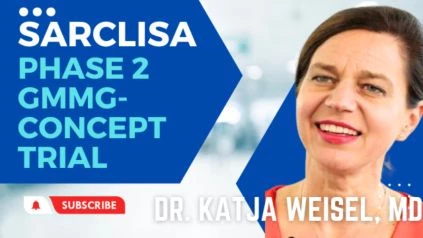By. Katja Weisel, MD
Date: October 25. 2023
In the world of multiple myeloma research, Dr. Katja Weisel, MD, stands at the forefront of groundbreaking clinical trials. Her work on the GMMG-CONCEPT trial, involving Isatuximab combination therapy, has unveiled a pivotal shift in the treatment landscape for high-risk multiple myeloma patients.
Achieving sustained minimal residual disease (MRD) negativity is a remarkable feat in the context of this complex blood cancer. MRD negativity implies that there is an exceedingly low level of cancer cells remaining in a patient’s system. In high-risk multiple myeloma, the significance of this achievement cannot be overstated. It marks a powerful indication of effective treatment and potential long-term remission, dramatically improving patient outcomes and quality of life.
The key findings from the GMMG-CONCEPT trial are particularly noteworthy for both transplant-eligible (TE) and transplant-ineligible (TNE) patients. The trial demonstrated notably high MRD negativity rates in both groups, suggesting that Isatuximab in combination with carfilzomib, lenalidomide, and dexamethasone (KRd) can be effective across a broad spectrum of patients. These results herald a new era in multiple myeloma treatment by providing hope and optimism for those who might not have been candidates for transplantation.
The trial’s methodology and design played a significant role in its success. Unique aspects of the trial included the combination therapy itself, involving the monoclonal antibody Isatuximab alongside carfilzomib, lenalidomide, and dexamethasone. The synergy of these agents likely contributed to the achievement of the primary endpoint – sustained MRD negativity. This innovative approach sets the GMMG-CONCEPT trial apart and offers a promising model for future research.
Sustained MRD negativity is not just a scientific benchmark; it also has profound implications for patient outcomes and quality of life. Patients who achieve MRD negativity are likely to experience longer periods of remission, reduced disease-related complications, and an improved overall quality of life. This sustained response holds the potential to transform multiple myeloma from a life-threatening condition to a manageable chronic disease, substantially improving the prognosis and long-term well-being of affected individuals.
Comparing the Isatuximab-based combination therapy, KRd, to other treatment regimens for high-risk multiple myeloma is crucial. While established treatments have made significant strides in managing the disease, the GMMG-CONCEPT trial’s results suggest that KRd may represent a potential new standard of care. The combination’s success in achieving sustained MRD negativity underscores its efficacy and sets a promising benchmark for future treatments, offering hope to patients with high-risk multiple myeloma and the medical community at large. Dr. Katja Weisel’s work in this trial has paved the way for a brighter future in the treatment of this challenging condition, ultimately improving the lives of countless patients.

